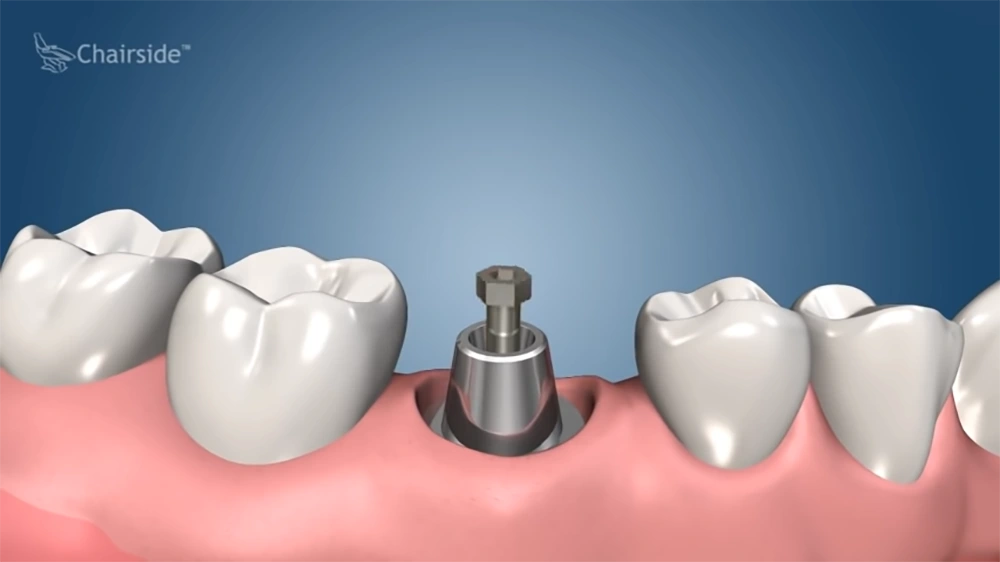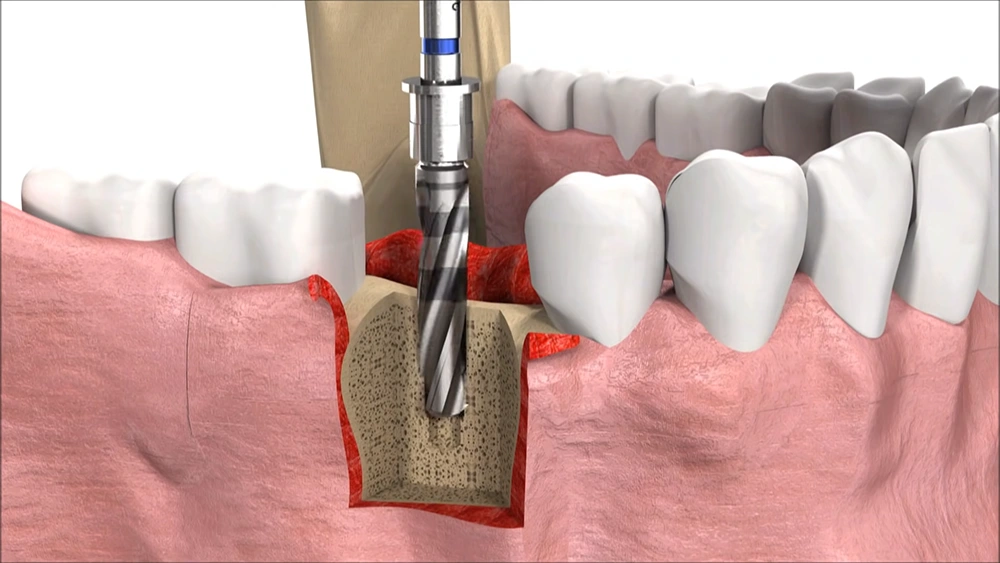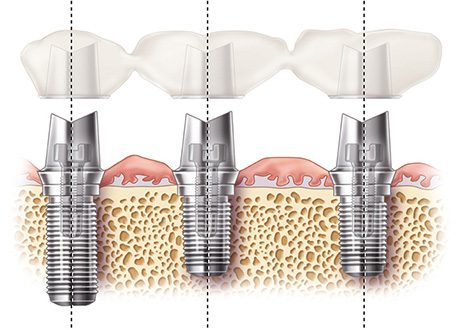
DENTAL IMPLANTS IN TIRANA
What is a dental implant used for
The simple answer is: “Dental implants are titanium screws designed to replace the root of missing teeth.” If you have missing teeth, opting for an implant might be the ideal solution for you. These implants are “bio-compatible,” indicating that the titanium material utilized in their production seamlessly integrates with the body, establishing a sturdy and healthy foundation for the subsequent placement of a permanent crown. The sucess rates of implant treatment at our clinic in Tirana are 98% which indicates a very high sucess rate.
Function: By replacing your missing teeth with dental implants in Tirana you restore the function of your teeth, improve digestive system through mastication.
Aesthetics: This means improvement of your apparence. Imagine having missing teeth in the front area of your mouth. This could be imbarracing for some people, causing social distancing and selfesteem issues.
Ora hygiene: Having gaps between your teeth causes food impaction. This cause increased risk of caries and bad breath. Dental implants in away substitute your own teeth and feel as natural as your own teeth. You can floss and brush just the same as before
Longevity: Dental implants could last a life time if you take care of them just like your own teeth. No special requirements are needed as long as you use water flossers regurarly for all on six and all on four and regular floss for single implants
Contraindications for dental implants:
Gum disease (periodontal disease): Patients that suffer from periodontitis or gum disease usually end up losing all their teeth due to mobility. Factors that contribute to this are a lack of oral hygiene over the years as well as hereditary factors. Before placing the dental implant in an infected area, it is crucial to first remove the teeth, clean the infected bone, and allow the body to heal for a couple of months.
While smoking is not an absolute contraindication, it significantly hinders the integration of the implant with the bone. It causes healing delays for the wound and is expected to have long term negative effects.
Uncontrolled Chronic Diseases: Uncontrolled chronic conditions such as diabetes, immune disorders, and certain cardiovascular diseases can affect the body’s ability to heal and fight infections. If diabetes is under control, then it is possible to perform the procedure; however, the dentist will need to take into consideration all necessary medical findings before making a decision.
Osteoporosis is not an absolute contraindication. Osteoporosis is characterized by a low density of the bone, which means it is more fragile and not strong enough to secure implant fixtures.
Low bone volume: When you extract teeth, after a couple of years, the extraction site of your bone shrinks, making it impossible to place a dental implant. In such situations, it is a good idea to get a GBR procedure right after the extraction to make sure the bone level will regenerate and remain the same.
Cancer treatments: Patients who have received chemotherapy or radiotherapy for cancer should wait at least two years post treatment before placing dental implants. Cancer treatments significantly reduce the immune system’s capabilities and, generally speaking, cause damage to your vascular system. It is important to let your body recuperate before dental implant treatments.
Types of dental implants in Tirana
Titanium alloy implants
Titanium implants were invented by Dr. P. Branemark. His first implant was placed into a human body in 1965, and it is to this day the most successful material used in orthopedic and dental fields. The composition is 80% titanium and the rest is cobalt, chromium, and other metals to increase its strength and durability. It is the most used and effective implant dentistry uses today. In rare cases, patients who are allergic to chromium or cobalt can have an allergic reaction. It is not a life threatening counterindication, as it could be removed within 2 months post placement.
Ceramic implants
Ceramic implants, or better yet, zirconia implants, are relatively new on the market and were introduced by Nobel Biocare. Despite the claims of the producers that it is metal free, these implants come from zirconium dioxide, which questions the fact that this implant is really metal free. The name Ceramic Implant is another marketing strategy since it has nothing to do with ceramics used to produce dental crowns. This type of implant has different strength characteristics compared to titanium implants, making its usage limited. Because of these factors and a lack of research, most dentists are not convinced to use this type of implant.
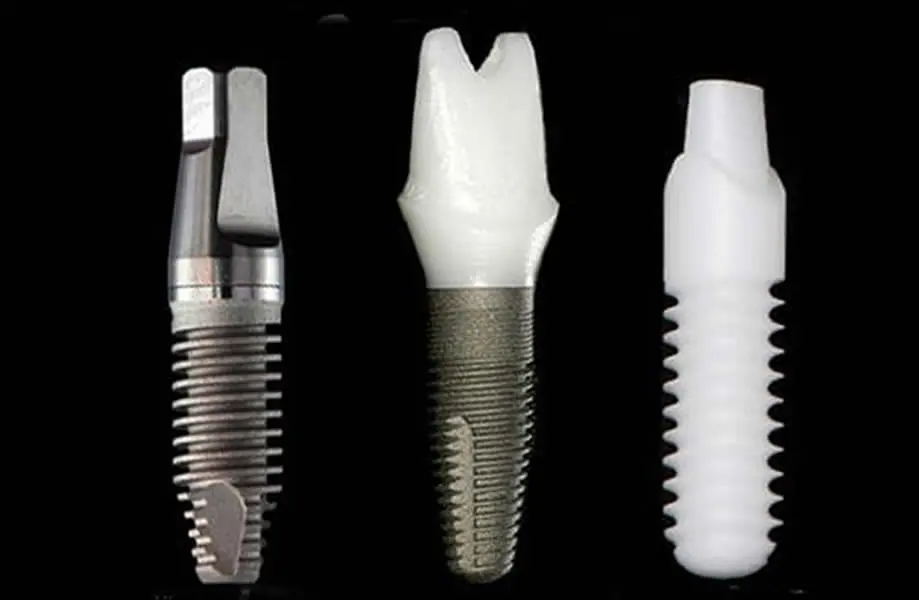
How are dental implants made?
This is a long technical process that starts with a titanium alloy rod that is cut and shaped by a computerized machine (CNC). Once the shape is cut according to design, they are then surface treated with various chemicals to make them adaptable to bone integration. The final stage is sterilization, which is the most important stage. Once cleaned and packaged, they pass through a gamma-ray machine, which results in a final 100% sterilization
Why are some dental implants more expensive?
Depending on the brand, the prices could vary. There are various types of implant designs for different treatment plans. Depending on which one is right for you, a good brand guarantees it will produce components for a specific implant brand for many years, whereas a small, unknown company could not exist after some time. Choosing a reputable brand is essential when selecting dental implants.
Is the procedure painful?
How much is a dental implants in Tirana
The cost of dental implants in Tirana varies depending on several factors. Firstly, it depends on the brand of the implant and the quality of the materials used. Different implant brands may have varying price points, and higher-quality materials may incur additional costs. Additionally, the experience and expertise of the operating dentist can influence the overall cost of the procedure.
It’s also worth noting that taxes applied in the dental implants cost in Tirana are relatively low compared to other regions, which can contribute to a more affordable overall cost for dental implant procedures.
At our clinic, we offer three different cost options based on the patient’s budget:
- €490 for patients seeking a more economical option.
- €590 for those looking for a mid-range option with enhanced features.
- €690 for patients who prioritize premium quality and additional benefits.
To provide an accurate estimate of the cost of the treatment, it’s best to schedule a consultation with us or alternatively send us your most recent panoramic xray and we will be able to give you an estimate.
Types of dental implant treatments

Single dental implants
When one tooth is missing for a while or one of your teeth needs to be removed, one single implant is enough to substitute a natural tooth. It consists of an implant, an abutment, and a dental crown, which could be the material of your choice. A single dental implant does not require the preparation of other teeth. Adjacent teeth are left intact, and only the missing tooth space is used to support the new crown.
3 units of bridge dental implants
If you’re missing three teeth on a raw implant, two implants can hold the weight of three missing teeth. It consists of two implants and a three-unit bridge. Does not require natural teeth to be shaved off.
All four dental implants
Typically, if you are missing your entire dentition, either the upper or lower jaw, and there is not enough bone to place six implants, a different design that consists of just four implants is used to hold the entire dental bridge. The best way to substitute 14 teeth is to have as many implants as possible. While All on 4 may not be the ideal solution, it can be successful in most cases if you prioritize oral hygiene and diligently follow your dentist’s aftercare guidance.
All six dental implants
This system is the preferred implant design treatment for people who are missing their entire dentition of either the upper or lower arch, or both. Six implants are strategically placed into your jaw to create the perfect foundation for your new teeth. This is the most durable and predictive way of getting a strong, long lasting solution. This system can easily be combined with zirconia teeth. It also gives you the possibility to get tempirary teeth the same day, unlike all on 4, where immediate loading of your teeth is limited.
Screw retention vs. cemented dental implants
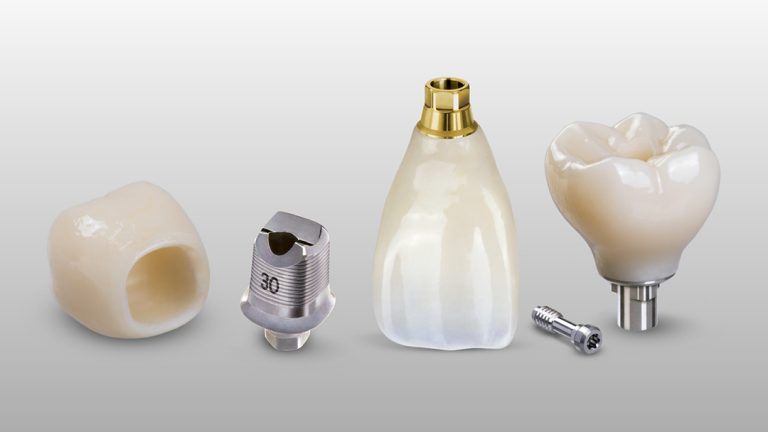
Bone Graft for Dental Implants (GBR)
Cemented
Once the final bridge is fabricated, the dentist will connect the dental bridge with permanent cement. There are two issues with this method:
The cement could leak inside your gums and cause implant failure later on.
If one of the implants has periodontitis or needs to be cleaned by a dentist, the bridge has to be cut out and replaced by a new one.
If ceramic is chipped, it can not be repaired, leading to costly replacements of the bridge.
Screw retained
This system allows the removal of the entire bridge without damage through premade holes in the center of your teeth.
Screw-retained implants offer superior hygiene as they can be periodically removed by the dentist for thorough cleaning.
Cost-effective, as you don’t have to spend much on repairs.
It gives you the possibility of treating any issues with your implants while still using the same dental work.
What are the materials used for bone grafting procedures?
There are four different categories of materials used today in dentistry as bone substitutes. They are used in different treatments based on their properties.
Autografts, or autologus grafts, are the patient’s own bone, which is taken from one area of the jaw and placed in another area of the jaw where the bone is insufficient and needed for implant placement. The bone is removed with special tools in a scraping or drilling fashion under local anesthesia. Sometimes a mix between this graft and another is made to increase the volume of the bone required.
Allografts are materials taken from human bones, often from a bone bank. The genetic material is removed, and the bone is processed. to be suitable for bone grafting.
Xenografts are bone materials taken from animals like pigs and bovines. Once collected, specialized equipment removes the genetic material, and all measures are taken to ensure they are safe to use on humans.
Alloplasts: these types of bone grafts are called sythetic grafts. They are not as efficient as real bone structures and have limited usage. However, this depends on the dentist’s judgment, depending on your case.
Indications
To improve the density of your bone prior to implant placement
To increase the volume of bone in areas needed for dental implants
Immediately after tooth extraction (bone preservation),
How to take care of your surgery site
After any dental surgery appointment, you should follow your dentist’s instructions strictly to avoid any complications.
Antibiotics: take them as prescribed. The most prescribed antibiotic for dental implants is amoxiciline, which should be taken either 6–7 or 10 days after treatment. 500 mg tablets of amoxyciline should be taken three times a day, or in case tablets are 1000 mg twice a day.
Cold compresses: Use cold ice packs for the first 48 hours to reduce swelling.
Mouthwash: Rinse for 5 to 7 days with mouthwash three times a day. Use anti stain mouthwashes to avoid staining your teeth. It is important not to use chest pressure when you rinse to avoid wound disturbance.
Healing time: healing time is individual for every patient. Wound healing requires approximately 2 weeks, but sometimes sutures are removed earlier. GBR and dental implants require 4 to 6 months to be fully integrated. Sometimes a longer period of time could be required, depending on many factors that will be decided by your dentist.
Sutures: sutures are used to speed up healing and maintain soft tissue in place. Ensuring good oral hygiene, consuming soft foods, and staying hydrated are crucial to promoting healing after dental implant procedures.
Colagene Membrane: in most cases, especially in regenerative procedures where bone grafts are necessary, a thin sheet of colagen membrane is used. This is to prevent any bacteria and food from getting inside the wound during the healing phase.
How do I prepare for treatment?
During the treatment for dental implants in Tirana, you should not feel any pain since dental implant procedures are always performed under local anesthesia. Take a day or two off from work and arrange for someone to drive you home. Once the anesthetic wears off, you should take over-the-counter medication like ibuprofene every 4 to 6 hours to ease any discomfort. You should expect some discomford during the first couple days. Once you leave the office, you should do your part to make sure the treatment is successful. Follow the instructions given by the dentist and ask for help in case something concerning arises. Some morbidity, swelling, and disconfirmation are normal. Reduce cigarette usage if you are a smoker to avoid delaying wound healing.
Maintenance long term
The oral hygiene regime is the most important part of implant maintenance. We at Toronto Dental suggest using a water flosser, as our patients have seen great benefits long term. We have been prescribing these tools for years now, and the results have been amazing. Using floss or normal toothbrushing is not realistic since, to be honest, nobody will stay half an hour every day to place the dental floss under the bridge.
Regular checkups are essential, as issues with implants can often be resolved promptly if detected early. This is why it is imperative to notify our clinic if something is wrong with the implant. If the bridge is lost or you notice changes, it’s always best to notify us so we can make adjustments, replace screws, or intervene to stop any possible infection around dental implants.
How is the dental implant done
